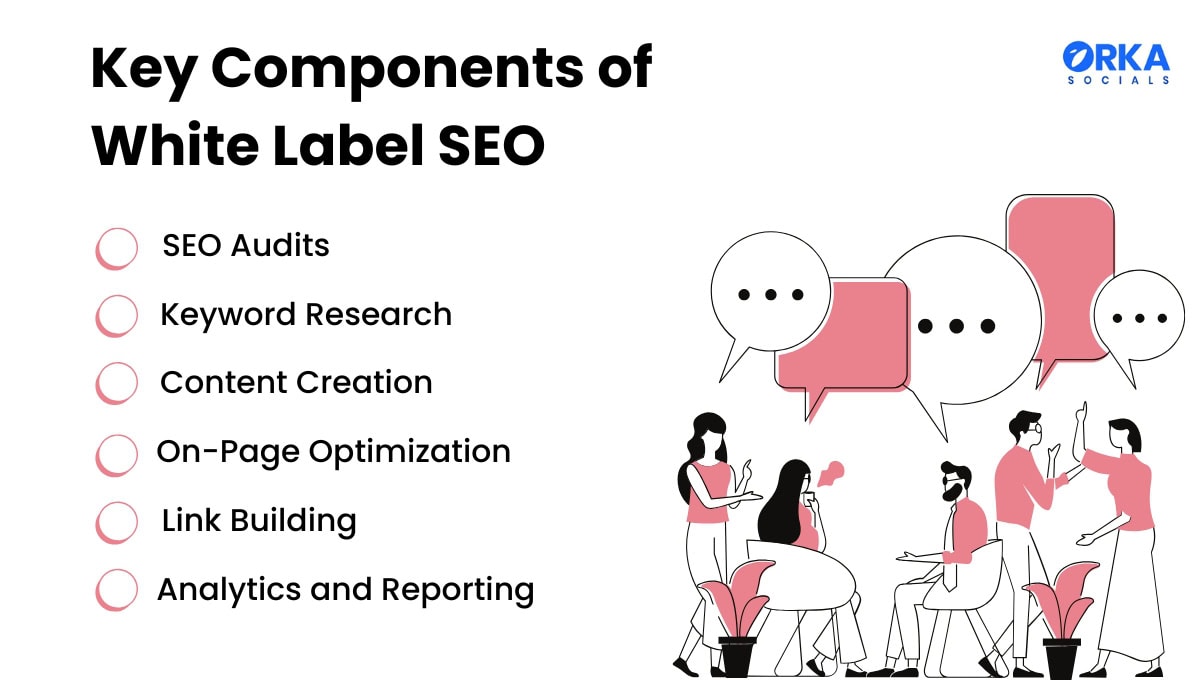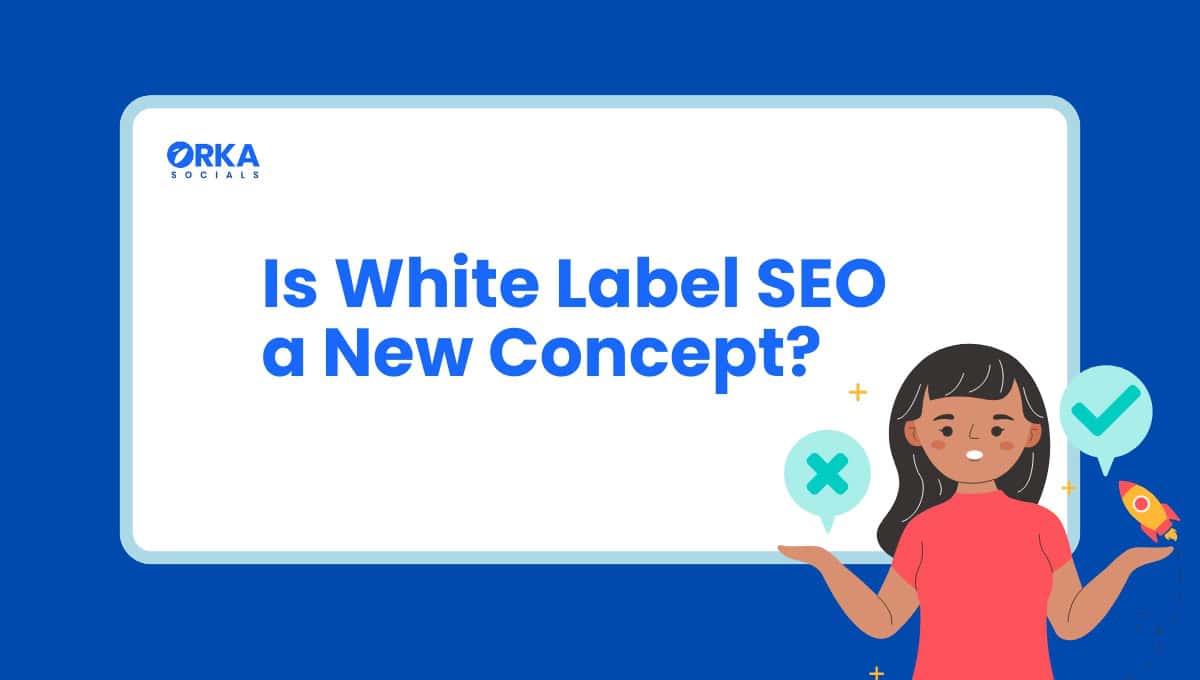Is white label SEO a new concept that can transform your business? In an increasingly competitive digital environment, many business owners need help to improve their online presence while managing their core operations. This article explores the critical role of white label SEO and its history. It highlights its benefits for agencies, freelancers, and business owners.
By the end of this read, you’ll see how adopting white label SEO can expand your service offerings and open up exciting growth opportunities. Have you ever wondered how to scale your SEO services without increasing overhead costs? Get ready to uncover how this innovative approach can help you thrive in a competitive digital world!
Understanding White Label SEO
White Label SEO is pivotal for agencies and freelancers aiming to enhance their service offerings without expanding their in-house capabilities. This section will clarify White Label SEO and its historical roots.
What is White Label SEO?
White Label SEO involves outsourcing SEO services to a third-party provider who then delivers these services under your brand name. This arrangement allows agencies and freelancers to offer comprehensive SEO solutions without needing in-house expertise.
Here are the key functions of White Label SEO:
- Enables Branding: Services are delivered under your brand, maintaining a smooth client experience.
- Expands Offerings: Allows agencies to provide a full suite of SEO services.
- Saves Time: Reduces the necessity for in-house SEO staff and training.
- Enhances Client Satisfaction: Delivers high-quality services that uphold your brand’s standards.
White Label SEO: A New Trend or Established Practice?
Despite often being perceived as a contemporary trend, White Label SEO has deep historical roots in digital marketing. Agencies have long embraced outsourcing to adapt to evolving technology and client demands. Today, White Label SEO is a mature practice with many providers offering customized solutions that help businesses stay competitive and meet client needs efficiently.
The Evolution and Emergence of White Label SEO

White Label SEO has evolved significantly, shaped by the market’s changing needs and technological advancements. This section will delve into its historical development and the initial reactions it provoked in the industry.
Historical Background of SEO
SEO began in the mid-1990s when web administrators optimized sites for the nascent Internet. Initially, this process was straightforward: submit a page’s URL to search engines, which would then crawl it to extract links and index data. However, by 2004, search engines like Google, Bing, and Yahoo began to incorporate a variety of undisclosed factors into their algorithms to counter manipulative link-building practices. This shift led SEO from simple tactics like keyword stuffing to more sophisticated strategies, setting the stage for specialized services like white label SEO.
Initial Market Reactions to White Label SEO
When white label SEO was first introduced, it received a mixed reception. While some agencies saw it as an opportunity to rapidly expand their services without the costs associated with hiring in-house teams, others were hesitant due to concerns about quality control and the potential impact on their brand reputation. As the market matured and more reputable white label SEO providers emerged, skepticism gave way to acceptance. Agencies began to appreciate the benefits, such as scalability and cost efficiency, leading to a broader integration of these services into their business models.
How White Label SEO Works
Understanding the operational aspects of white label SEO is crucial for agencies and freelancers aiming to broaden their service spectrum. This section outlines the process and essential components of effectively implementing white label SEO services.
The Process of White Label SEO
Implementing white label SEO involves a series of well-defined steps to ensure success:
- Establishing Partnerships: Form collaborations with reputable white label SEO providers who can reliably extend your service capacity.
- Branding Services: Market the SEO services under your agency’s branding, ensuring a seamless client experience.
- Customizing Strategies: Develop customized SEO strategies that address each client’s needs.
- Generating Reports: Provide comprehensive analytics regularly to keep clients informed of their campaign progress.
- Managing Client Communication: Act as clients’ primary point of contact, maintaining clear and consistent communication.
Key Components of White Label SEO

White label SEO encompasses a suite of services that agencies can leverage to deliver a full-scale SEO strategy:
- SEO Audits: Conduct thorough analyses to evaluate website performance and pinpoint areas for improvement.
- Keyword Research: Identify high-potential keywords that target the client’s audience effectively.
- Content Creation: Develop high-quality content that is engaging and optimized for search engines.
- On-Page Optimization: Make technical enhancements to website elements to boost search engine rankings.
- Link Building: Build a portfolio of authoritative backlinks to enhance the site’s credibility and authority.
- Analytics and Reporting: Offer detailed reports on SEO performance metrics to illustrate the strategies’ impact.
These components are critical for agencies to provide comprehensive, scalable SEO solutions, particularly when in-house capabilities are limited. This approach supports business growth and enhances the overall service quality offered to clients.
Benefits of White Label SEO for Agencies and Freelancers
White label SEO services are indispensable for agencies and freelancers looking to enrich their service portfolios without the associated high costs. This section discusses the financial advantages and quality enhancements that white label SEO offers.
Cost-Effective Solutions for Expanding Service Offerings
Utilizing white label SEO allows agencies and freelancers to augment their service offerings significantly while keeping expenses low.
Key benefits include:
- Lower Overhead: Reduce expenses by cutting costs related to hiring and training through SEO outsourcing solutions.
- Varied Pricing: Access a range of affordable SEO packages tailored to fit various budgets and client needs.
- Scalable Services: Adjust service offerings dynamically based on client demands, ensuring seamless scalability.
- Faster Deliverables: Benefit from the established processes of experienced white label SEO providers for quicker service delivery.
Enhancing Service Quality Without the Overhead
Adopting white label SEO can substantially improve the services’ quality while controlling operational costs.
Notable advantages are:
- Access to Expertise: Gain insights and support from seasoned SEO specialists who can deliver custom, top-tier SEO solutions.
- Reliable Outcomes: Deploy proven SEO strategies that improve client performance and ensure predictable results.
- Enhanced Brand Reputation: Strengthen client trust by delivering consistently high-quality results under your agency’s branding.
- Improved Resource Allocation: Allocate your internal resources more effectively by focusing on core business operations and letting white label experts handle SEO tasks.
Comparing White Label SEO and Traditional SEO
Understanding the distinctions between white label SEO and traditional SEO is crucial for agencies considering their operational strategies. This section explores their service delivery models and how client expectations have evolved.
Key Differences in Service Delivery Models
When evaluating white label SEO outsourcing versus traditional in-house SEO, notable differences include:
Scalability:
- White Label SEO: Easily scales to accommodate client needs.
- Traditional SEO: Often faces scalability limits; typically requires additional hiring.
Resource Allocation:
- White Label SEO: Allows agencies to focus on core services while outsourcing SEO.
- Traditional SEO: Demands significant internal resources and expertise.
Cost Structure:
- White Label SEO: Generally more cost-effective, minimizing overhead.
- Traditional SEO: Incurs higher costs associated with salaries and ongoing training.
Service Variety:
- White Label SEO: Offers access to a broad range of SEO packages and expert capabilities.
- Traditional SEO: Services are restricted by the skills available in-house.
Speed of Implementation:
- White Label SEO: Enables quick strategy deployment.
- Traditional SEO: Slower rollout due to internal processes.
Client Focus:
- White Label SEO: Provides a seamless brand experience by utilizing external expertise.
- Traditional SEO: Facilitates direct interaction between clients and the in-house team.
Evolving Client Expectations in SEO
Clients today increasingly demand quicker, more adaptable SEO solutions, which often makes the white label model more appealing. Essential expectations include:
- Speed of Delivery: Clients want rapid results, making the swift execution capabilities of outsourced SEO solutions particularly attractive.
- Flexibility: White label services offer customized solutions to meet varied client needs better.
- Quality Control: Utilizing specialized expertise from white label providers ensures effective, high-quality strategies.
- Cost-Effectiveness: Clients seek affordable options that deliver impactful results without significant overhead.
Understanding these differences is key for agencies aiming to meet modern client demands and maximize the benefits of white label SEO.
Addressing Common Concerns with White Label SEO
As agencies and businesses explore white label SEO, they often encounter concerns regarding quality control and pricing. This section provides strategies and insights to alleviate these concerns and instill confidence in outsourcing SEO services.
Ensuring Quality Control in Outsourced SEO
To maintain high-quality standards in outsourced SEO, agencies should consider the following strategies:
- Vetting Providers: Conduct thorough research to identify reputable white label SEO providers with proven track records.
- Setting Clear Expectations: Clearly define the scope of work, expected deliverables, and timelines at the outset of the partnership.
- Maintaining Regular Communication: Establish open lines of communication for regular updates and feedback to ensure alignment and address any issues promptly.
- Tracking Performance: Utilize analytics tools to monitor key performance indicators (KPIs) and assess the effectiveness of the SEO campaigns.
- Gathering Client Feedback: Actively seek and incorporate client feedback to continually refine and improve the services offered.
Understanding Pricing and Value
When evaluating the pricing and value of white label SEO services, consider these key points:
- Transparent Pricing: Opt for providers that offer clear, upfront pricing structures to avoid unexpected costs.
- Cost vs. Quality: Recognize that higher costs may reflect superior quality. Assess the potential return on investment (ROI).
- Exploring Package Options: Investigate various SEO package options to find one that best suits your agency’s needs and budget constraints.
- Seeking Value-Added Services: Consider providers with additional training and support as part of their service offerings.
The Future of White Label SEO

As the digital dynamic evolves, white label SEO continues to gain traction. This section explores the anticipated growth of this sector, and the challenges and opportunities agencies may encounter in this dynamic environment.
Growth Predictions for White Label SEO
Experts predict significant expansion in the white label SEO market, driven by several key trends:
- Increased Demand: As more businesses seek to focus on their core competencies, outsourcing SEO is becoming an increasingly popular option.
- Technological Advancements: Innovations in artificial intelligence (AI) and automation are streamlining SEO service delivery.
- Diversification of Services: Agencies are expanding their offerings through strategic partnerships with white label SEO providers.
- Global Reach: The global rise of digital marketing is opening up new opportunities for agencies to serve an international clientele.
Challenges and Opportunities for Agencies
The future holds promise, but agencies must tackle both challenges and opportunities to capitalize on the potential of white label SEO:
- Quality Assurance: As demand grows, maintaining high service quality becomes more challenging but increasingly essential.
- Market Competition: As the market expands, increased competition may pressure pricing structures and profit margins.
- Client Expectations: Agencies must adapt continuously to meet evolving client demands for faster and more flexible SEO solutions.
- Strategic Partnerships: Building strong relationships with white label SEO providers can enhance service offerings and improve client satisfaction.
By staying informed of these trends and prepared for these White Label SEO challenges, agencies can strategically position themselves for success in the burgeoning white label SEO marketplace.
Conclusion
White label SEO offers substantial advantages for agencies and businesses seeking to scale their SEO services efficiently. By partnering with reputable providers, agencies expand their offerings, uphold high quality, and minimize operational costs. This model allows businesses to concentrate on their core competencies while offering a variety of SEO packages tailored to meet diverse client needs.
As the demand for effective SEO solutions grows, white label SEO stands out as a strategic choice for enhancing service portfolios and meeting clients’ evolving expectations.
Ready to explore white label SEO services? Contact us today for a free consultation and discover how Orka Socials can help you scale your business effectively!
Frequently Asked Questions
Yes. White label SEO suits various businesses, including agencies, freelancers, and small to medium-sized enterprises looking to expand their service offerings.
Absolutely! White label SEO providers typically offer customizable solutions to meet different clients’ unique needs and objectives.
White label SEO helps agencies maintain a consistent brand experience while delivering high-quality services, which can significantly boost client trust and satisfaction.
Yes. Agencies can improve client satisfaction and retention rates by providing top-notch SEO services through white label solutions.
The primary risks include quality control and potential miscommunication. Agencies can mitigate these by carefully selecting providers with strong reputations and setting clear, detailed expectations upfront.
Look for providers with a proven track record, transparent pricing, and customizable services that align with your business goals and client needs.
Agencies should look for contracts that specify clear terms about pricing, service deliverables, performance metrics, and available support to ensure a transparent and successful partnership.


